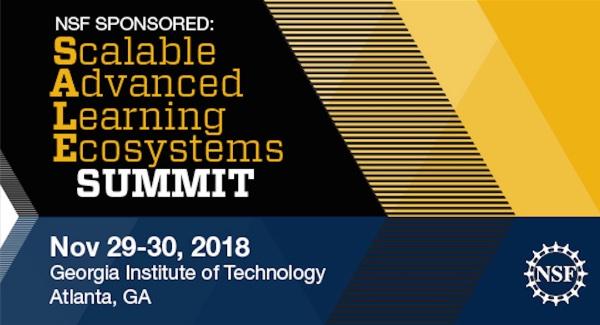From Nov. 29-30, Georgia Tech was host to a National Science Foundation (NSF) funded summit focused on the development of affordable, sustainable, and scalable educational environments, or Scalable Advanced Learning Ecosystems (SALE).

The SALE Summit took place at the Global Learning Center and was co-sponsored by the Center for 21st Century Universities (C21U) and Georgia Tech Professional Education (GTPE).
This summit brought academic and industry leaders from across the globe together in the hope of laying the foundation for the next generation of learning ecosystems. Topics such as data analytics, learning design, artificial intelligence, growth and future business models for higher education, and the changing role of university faculty were addressed by keynote speakers and discussed in breakout groups.
SALE Summit speakers included:
-
Chris Dede of Harvard University
-
Karen Vignare of the Association for Public and Land-grant Universities
-
Stephanie Norby and Brian Mandell of the Smithsonian Science Education Center
-
Gisele LaRose of WebStudy Foundation
-
Cary Brown of IMS Global
-
Provost Rafael Bras of Georgia Tech
-
Rob Kadel, Rich DeMillo, and Lindsay Kelly of C21U, Georgia Tech
-
Yakut Gazi and Nelson Baker of GTPE, Georgia Tech
-
Ashok Goel of the College of Computing, Georgia Tech
Participants were challenged to consider many of the most taxing issues facing higher education today and to work together to begin the planning stages for a new roadmap for education. This roadmap will look to the future of education in the next five to ten years and will outline ways that educators, industry leaders, government officials, and technologists can redesign the future of learning and education.
In his plenary presentation, Nelson Baker, dean of professional education at Georgia Tech, said, “Education is more than a collection of courses. What else might be missing from that collection?”
Summit attendees explored innovative pedagogical and technology-driven educational solutions such as Ashok Goel's work with automated, intelligent tutoring systems and the Smithsonian’s Science for Global Goals curriculum, presented by Stephanie Norby and Brian Mandell. Social and economic issues surrounding curriculum design were also discussed. Recognizing that low-income and minority students often fall behind in introductory courses, risking their chances of completing a degree, Karen Vignare, of the Association for Public and Land-grant Universities, gave an eye-opening plenary on using adaptive courseware to assist these students.
“How do we achieve 1x1 tutoring at scale and bring down the cost, so that we can still bring education to the students of the future who really need it?” asked Rob Kadel in his plenary remarks.
This question and many others will be addressed in a white paper produced as an outcome of the SALE Summit.
SALE Summit
To find out more about how can you get involved in the work of C21U or GTPE, please visit c21u.gatech.edu or pe.gatech.edu.
This summit was funded by a generous grant from the National Science Foundation (NSF) - grant #1824854.
